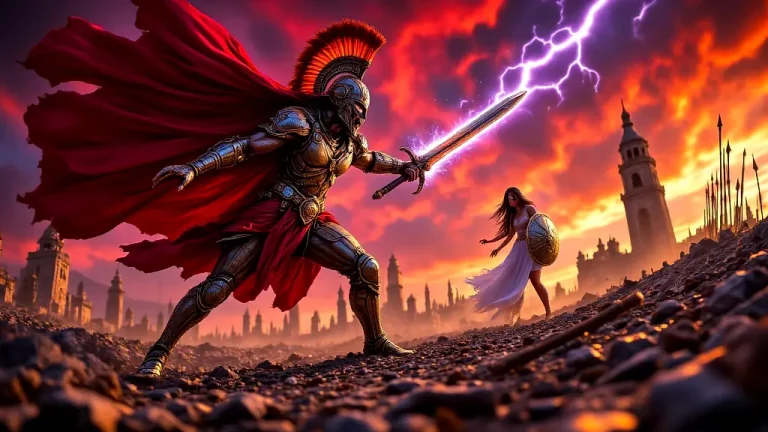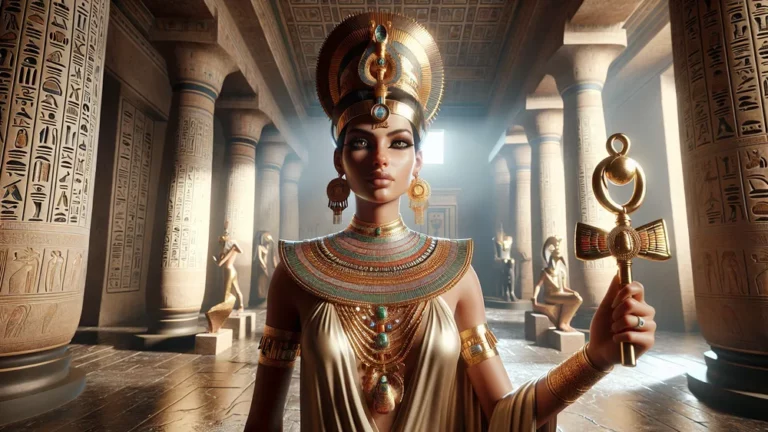Aletheia: Greek Goddess Of Truth And Sincerity In Mythology
When you think about all the stories in Greek mythology, where gods and goddesses represent different parts of human life, Aletheia is there as an example of truth and sincerity. Picture her like that friend who always tells it like it is, even when it’s hard to handle. This job is important in a place where tricks and false images often make things unclear.
Key Points:
- Aletheia is the Greek goddess of truth and sincerity.
- She is often linked to Zeus or Prometheus as her parent.
- Common symbols for Aletheia include a mirror and scales.
- Aletheia played a major role in Greek stories, showing the importance of honesty.
- Greek thinkers like Plato and Aristotle discussed her ideas about truth.
- People honored Aletheia through various ceremonies focused on truth.
- Her influence reached Roman culture as Veritas, representing the same values.
During this look at Aletheia, her beginnings, you’ll learn about, how she fits in Greek stories and her lasting influence on old and new cultures. Whether you’re already deep into mythology or just now starting to explore these old stories, knowing Aletheia lets you see how Greeks cared about truth in what they said and how they lived.
Aletheia: Overview and Key Facts
| Key Aspect | Details |
|---|---|
| Name | Called Aletheia |
| Role | Goddess of Truth and Sincerity |
| Origin | Greek Mythology |
| Parentage | Usually linked to Zeus or Prometheus, varies by story |
| Symbols | Mirror, Scales |
| Pictures | She often appears as a calm woman with a mirror or scales |
| Cultural Influence | In Roman stories, her influence appears as Veritas |
| Greek Thinking | This idea connects with truth in Greek thinking |
| Honor Events | Honored during different Greek events and customs |
| Modern Legacy | Still stands for truth in today’s thinking about mythology |
Where Aletheia Comes From
To really get why Aletheia is important in Greek myths, you need to look into where she comes from and the stories about her.
How Aletheia Was Born
In Greek myths, Aletheia’s beginnings are as interesting as what she does. By some stories, she is seen as the daughter of Zeus, the chief god, which means her power over truth is very strong. Other times, she is connected to Prometheus, a Titan known for being smart and seeing the future, showing that truth is like a gift of understanding to people.
Think of Aletheia like a light in a place often covered in darkness, helping those looking for truth and understanding. Her story is more than just about divine family; it’s about truth being everywhere in the world.
Aletheia appears in different myths, each pointing out her importance in various ways. Some stories mention:
- In tales from the Golden Age, she walked among humans, being the simple and honest spirit of that time.
- Philosophers talked about her as a basic idea of knowing and wisdom.
- In some stories, Aletheia appears opposite lies and false things, making clear the need for truth in human actions.
These stories mean not only her place in tales but also how the old Greeks really valued truth as something important to live by.

Aletheia, sometimes seen as Zeus’s daughter or linked to Prometheus, symbolizes the vital importance of truth and understanding in Greek myths.
Aletheia in Greek Legends
In Greek stories, she holds a key place as the goddess of truth and sincerity, acting as a guide in a world often filled with lies and tricks. In these stories, she means those old Greeks thought honesty and integrity were important. If you think of her like a lighthouse helping ships stay on track during storms, it makes sense.

Her effect is clear when truth wins over false things, making her a sign of being good. But really, her importance is more than just stories; she stands for the good ways that were part of Greek life, reminding people of being honest and sincere. Her pictures in old books and art make her role in Greek life even stronger. Often seen as calm and sure, she shows the peace that truth brings.
Art often has a mirror to mean knowing yourself and being honest, and scales to mean balance and fairness. Such pictures make clear her job as the one who decides what is true. Through these artistic and written forms, Aletheia’s truthfulness is clearly seen, letting us see how Greeks honored truth in their stories and lives.
What Aletheia Stands For
To really get what Aletheia is about, you need to look at the symbols and influences that mean she is the goddess of truth and sincerity.
Things Linked to Aletheia
Aletheia, being the example of truth and sincerity, links with many strong symbols that include what she is about. These symbols mean her traits and come from the cultural idea of what truth is. Think about these symbols linked to Aletheia:

- Mirror: This means thinking about yourself and being honest, as looking into a mirror makes you see yourself as you are. It brings the clarity and openness that truth gives.
- Scales: These usually mean balance and fairness, and they mean how fair and unbiased truth is. Just like scales weigh to find out the true weight, they can also mean checking actions and words to find their honesty.
These symbols not only mean Aletheia’s part in stories but also give a real link to the values of truth and honesty, making her traits easier to understand for those who want to live by them.
How Aletheia Affected Other Gods
Aletheia’s traits of truth and honesty had a big effect on the Greek gods, making their choices and interactions. Honestly, like a ripple in water, she pushed other gods to accept honesty and to be fair when they did things. Take Zeus, for example; with his complicated ways, he often turned to Aletheia to figure out real from not real, especially to decide things among gods and people.
Moreover, even Athena, the goddess of wisdom, was affected. Truth was key to her way of thinking and idea of justice. Aletheia’s role as the example of truth made a hidden guide, helping these powerful ones to make sure what they did stayed fair and honest. In many stories, Aletheia’s effect can be seen, meaning she played a key part in godly tales.
For instance, the Trojan War stories, where gods played tricks and didn’t tell the truth. In moments, like Hera wanting to find the real reasons behind gods’ actions, Aletheia’s presence was there when truth won. Also, think about Apollo. As the god of future sight, he called on Aletheia to make sure his future sights were honest and trustworthy.
These tales mean how Aletheia’s traits were in the story-world of myths, reinforcing why truth and honesty were important in these gods’ twisting, turning stories.
Aletheia’s Place in Old Greek Life
To get how Aletheia’s effect worked outside the godly world, it is important to see how her ideals of truth and being honest became part of everyday life in ancient Greece.
Aletheia and Greek Thinkers
In the world of Greek philosophy, Aletheia’s idea of truth wasn’t just a mythical idea. It was a key part of searching for ideas. Greek thinkers like Plato and Aristotle, they looked closely at what truth is, often talking about Aletheia as a sign of the ultimate reality they tried hard to know.
Plato, for example, thought of true knowledge as grasping everlasting truths beyond our physical world, much like finding out Aletheia’s core. But, Aristotle preferred seeing things and using clear thinking as a way to truth, which means Aletheia’s effect on him in his search for knowledge.
Importantly, these thinkers saw looking for truth as a journey, similar to moving through a complicated maze to reach the middle, where Aletheia’s presence seemed near as something guiding. Through their writing, Aletheia’s ideas became part of the very structure of thinking, shaping how people studied ideas in ancient Greece and later.

Aletheia, representing truth in Greek philosophy, was seen by thinkers like Plato and Aristotle as essential for understanding reality, influencing their journeys toward knowledge.
Aletheia in Greek Ceremonies
In old Greece, people showed respect for Aletheia with different ceremonies that focused on truth and honesty. These events were often group gatherings where people did things to honor the goddess and her values. For example, one usual ceremony was saying promises. People would promise to keep being truthful in their personal and public lives, sort of like taking an honesty vow today.
These weren’t just religious events; they also meant social agreements, keeping truth important for peace and fairness in the group. By doing these ceremonies, Greeks wanted Aletheia to be there, thinking she would mean a more honest life.

This gives a clearer picture of how Aletheia was honored. Here’s a table about some specific festivals and ceremonies for her:
| Festival/Ceremony Name | Time of Year | Main Activities |
|---|---|---|
| Festival of Truth | Spring | Promise-taking, contests about telling truth, and sharing moral tales. |
| Aletheia’s Vigil | Autumn | Night-long quiet times where people thought about their truths and shared honest stories. |
| Day of Sincerity | Winter | Gatherings with talks and chats on why truth matters daily. |
These events mean the important place that Aletheia had in Greek society, showing truth not just as a big idea, but something lived and shared through these group events.
Aletheia’s Impact Through Time
When the old Greeks honored Aletheia with their rituals and thinking, her effect started to be felt outside their land. This had an impact that would be there over time.
Aletheia’s Touch on Later Cultures
When the idea of Aletheia left Greece, it found a good place in Roman culture, where truth appeared in the form of the goddess Veritas. She, like Aletheia, was seen as the representation of truth and sincerity, affecting Roman values and their laws.
This is similar to how new ideas today spread globally, landing in different places but keeping their main parts. Interestingly, not only in Rome, but other ancient groups also took in ideas about truth and rightness, putting them into their own stories and rules. In Egypt, the idea of Ma’at meant truth and order, much like Aletheia.
These changes mean truth is an idea many accept, and it shows how Aletheia’s impact went beyond cultures, shaping the moral and ethical systems in jumprse groups.

Today’s Take on Aletheia’s Tale
Today, people who like old stories find Aletheia’s myth interesting, and it means a lasting memory about looking for truth. Aletheia is seen now as a sign of staying real in a world full of mixed things, and this idea, it connects to Aletheia’s role in art and books today.
For instance, in writing and painting, she appears as a symbol of truth, which makes ideas about truth and honesty important. People often talk about her story when they mean truth and honesty, which means old stories can still connect with today’s ideas.
This ongoing curiosity with Aletheia shows that many people like her story, which means old myths still change and affect how people think now.
Pantheon of Greek Spirits and Daimones
In Greek myths, spirits and daimones have an interesting place; they act as go-betweens for gods and people, often representing certain parts of life or nature. You see beings like the kind Agathodaemon or the playful Keres; they are important in stories similar to how protective angels or tricky spirits appear in other cultures’ tales.
Moreover, people curious about all of these beings can find them in a full list of all the Greek Spirits and Daimones which provides detailed information about their roles and characteristics. This group of spirits and daimones adds to Greek myths, giving clearer views of how ancient Greeks saw the unseen forces shaping people’s lives.
FAQs
1. Who were Aletheia’s parents in Greek mythology?
Aletheia’s parents in Greek mythology are often considered to be Zeus and the Titaness Themis.
2. What symbols are associated with Aletheia?
Symbols associated with Aletheia include the mirror and the scales, representing truth and balance.
How Aletheia was worshipped in ancient Greece involved rituals and ceremonies that emphasized truth and sincerity, often integrated into broader religious practices.
4. What is Aletheia’s legacy in modern culture?
Aletheia’s legacy in modern culture is reflected in the continued emphasis on truth and sincerity as fundamental values in philosophical and ethical discussions.







